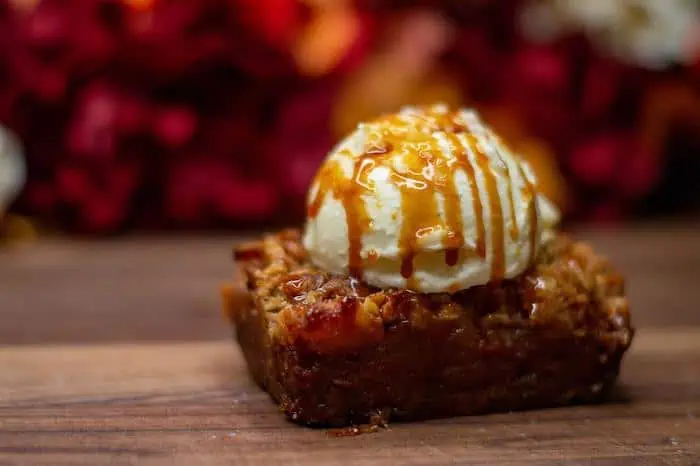Can Dogs Have Caramel Corn?: Inquiring Readers Ask
Many people’s all-time favorite sweet snack is caramel corn, also commonly known as caramel popcorn. This is especially true when the time of year for celebrating many of the fall and winter holidays arrives.
However, is there any risk involved if you give your dog a bite or two of that delightful popcorn treat? Can dogs have caramel corn?
The simple answer to this question is that dogs should never have caramel corn. This is because the caramel coating on the popcorn will be responsible for a number of negative health effects on your pup. It is typically made with butter and is guaranteed to have a high concentration of sugar that is not good for canines.
Both of these things aren’t good for your dog’s health, and they can lead to digestive issues as well as unnecessary weight gain, among other health concerns.
If your pup does manage to get a few bites in, we highly doubt that it would cause them any immediate harm. However, in large quantities, it can cause stomach aches and trouble with regulating their insulin and blood sugar levels.
What Exactly is Popcorn?
Simply put, popcorn is just popped corn, and corn can often be found in many various commercial dog diets. When cooked via certain methods specific to making popcorn, maize kernels that have been dried and brittle turn into puffy, white popcorn that pops open to form this delicious treat.
Is It Unhealthy for Dogs to Eat Popcorn?
Popcorn that has been completely popped but has not been seasoned in any way is okay for dogs to consume in limited amounts as long as it has been popped using techniques that do not involve the use of oil. Popcorn is rich and high in fiber, vitamins A and C, and other essential nutrients that are found in ordinary yellow or white corn. The cooking process does not take away from its nutritional value.
The primary reason why it’s not a good idea to give your dog popcorn is due to the fact that popcorn is often made for human consumption and prepared in a way that we typically use for making unhealthy human snacks. The conventional popping methods include the use of oil, resulting in the addition of fat and calories, both of which can give your dog digestive problems and lead to unhealthy weight gain. The same is still true for high-quality butter that is often included in many popcorn recipes.
Salt is another factor that may lead to various health issues, and some seasonings for popcorn—like artificial cheese and ranch powders—can be harmful to dogs. Particularly with popcorn that’s made to be prepared in a microwave, artificial preservatives and unhealthy fats can be found in abundance.
Additionally, unpopped or barely popped kernels pose a choking threat and may also potentially harm your dog’s teeth if they are ingested regularly. Popcorn hulls have the potential to become lodged in your canine’s teeth, where they can irritate or even injure the gums just like they do when they get stuck in our human teeth. Unfortunately, our pups can’t use toothpicks nor properly tell us how to help them when this occurs.
According to many vets, dogs’ most easily recognizable responses after eating buttered popcorn are nausea and vomiting. Dogs that are given excessive amounts of salted popcorn are at risk of developing more significant health problems, including dehydration and damage to the kidneys due to consuming an excessive quantity of salt. These signs and symptoms often go away on their own, but if your dog appears to be having a significant reaction to consumption of buttery or salty popcorn, it’s worth contacting your veterinarian to make sure you’re taking the right steps to help their health improve.
If dogs are regularly fed popcorn that has been processed for human consumption and contains all these additional calories and chemicals, this can lead to obesity in the dog as well.
Is Caramel Hazardous for Dogs?

Caramel is not immediately hazardous to dogs, but it does include a high amount of sucrose (sugar), which can cause dogs to have stomach disorders such as vomiting and diarrhea. Caramel does not contain any other harmful ingredients, but some recipes will include milk or cream, which can upset the stomachs of dogs who have lactose intolerance.
In addition, there is a link between ingesting significant quantities of caramel and causing harm to the liver due to making it process so much sugar at once. Consequently, it is essential for people who own dogs not to give their dogs caramel or any other kind of candy that may be harmful to them if they consume it. Ingestion of substantial quantities of any of these substances is likely to be fatal for dogs.
What Will Happen If Your Dog Consumes an Excessive Amount of Caramel?
Dogs have an acute sense of smell, and if they are left unattended, they have a tendency to misbehave and may even crawl into your cupboard or pantry in search of food or a yummy snack. What steps should you take to determine if your dog has been snacking on your caramel candy?
The very first thing to check is whether or not the caramel candy has a chocolate coating on top of it. If this is the case, you need to call or take your dog to the vet as soon as possible since chocolate is toxic to dogs and may be especially problematic when coupled with something as high in sugar as caramel. If this is not the case, keep an eye out to see if your pup is chewing on something really sticky because doing so can cause it to choke or cause a blockage in its stomach, so you need to catch them as soon as possible.
However, even if you believe that your dog’s life is not in immediate danger, you should still be prepared for the repercussions of the sugar rush, which includes hyperactivity followed by drowsiness. It’s best to call your vet when this happens so you can be provided with more accurate information on symptoms to watch for as well as how to manage them based on your dog’s size, breed, and health history.
Can Canines Eat Caramel Syrup?
Because of the large amount of sugar in caramel syrup, it is not safe for dogs to consume any amount of this sweetener. Sugary snacks pose a significant threat to canines, especially if consumed regularly.
Can Pups Eat Caramel Ice Cream?

Both ice cream and caramel are delicious desserts that may satisfy a craving for something sweet. However, if you take both of these elements and mix them, you can only just begin to fathom the amount of sugar that is in caramel ice cream.
In addition to this, ice cream is typically produced using milk, and many dogs have a sensitivity to lactose. This condition means that certain dogs are unable to effectively digest lactose, which is a sugar contained in milk. As a result, they experience gastrointestinal distress when they consume milk-based products. Therefore, it is going to be for the best if you just have caramel ice cream all by yourself and keep it a secret from Fido.
Can Canines Eat Caramel Yogurt?
The plain and nonfat plain varieties of yogurt are considered to be the most suitable for canine consumption. However, this means that caramel yogurt should not be given to dogs. Your pups would be better off eating yogurt that is not sweetened with artificial sweeteners and does not include any artificial preservatives or added sugars. There are a variety of yogurts outside plain yogurt that dogs can enjoy, and some of these yogurts may even be beneficial to their health. Make it a habit to examine the ingredient list before trying anything new.
Avoid giving your dog any yogurt that has been sweetened with xylitol, a popular sweetener found in goods intended solely for human consumption. Even the smallest amount of yogurt sweetened with xylitol can be hazardous for dogs and induce liver failure as the compound rapidly accumulates in the liver’s tissue. You should steer clear of fruit-flavored yogurts as well as those that have mix-ins because these yogurts typically contain sugar in the form of syrup and artificial sweeteners, too.
Are Caramel Rice Cakes and Caramel Apples Safe for Dogs to Consume?
If a dog consumes rice cakes or apples that have been sweetened with caramel, the dog is in danger of serious health concerns or even death. The sweeteners in the caramels trigger an insulin response in dogs, which can induce seizures, unconsciousness, and even death in extreme cases. As mentioned above, snacks and treats containing caramel should be avoided at all costs.
What Kinds of Popcorn Are Safe for My Dog to Eat?
There is a wide variety of popcorn available, some of which are better for your dog to eat than others.
The ideal popcorn is unseasoned, air-popped corn that lacks butter and any other seasonings or flavorings. A few pieces here and there won’t do much for your canine nutritionally, but it also comes with minimal risk of gastrointestinal disorders because it is so infrequently consumed and has remained plain.
You should steer clear of caramel corn, though. Although the caramel itself might not be harmful to a dog’s health, the sugar concentration might be, and this might be especially problematic for diabetic canines.
Additionally, you should steer clear of popcorn covered in cheese as well. These powdered cheeses used for cheese-flavored popcorn typically contain a lot of unusual chemicals and preservatives along with a lot of salt, and all of these ingredients can make your dog digestively upset or sickly in general.
How Much Popcorn Can My Dog Eat Before It Becomes Unhealthy?

When it comes to providing your pup with treats or snacks, you should, as a general guideline, adhere to the “10% rule.” This rule stipulates that no more than 10% of your dog’s total daily calorie intake should come from foods like popcorn or treats.
When it comes to popcorn, you’ll want to err on the side of caution and estimate quite a bit less than what you actually need. It is not worth the risk of stomach difficulties since it is impossible to determine the exact quantity of something that is so little and can be eaten as a snack by the handfuls.
A diet that is both well-balanced and comprehensive is essential to maintaining your dog’s health in the long run. Even while sweets and treats have a place in a diet that is otherwise nutritious, one should limit their consumption as much as possible to ensure sustained vitality, especially when pups are the ones wanting to share in our favorite snacks.
See Also:
What Sauces Can Dogs Eat? (4 Options)
Can Dog Eat Yellow Rice? Read This First!
Can Dogs Eat Fruit Roll-Ups? Detailed Explanation
Can Dogs Eat Nopales? Read This Frist!

Family Dog Expert Author
Hi there! I’m Stuart, a devoted dog lover and family dog expert with over a decade of experience working with our furry companions. My passion for dogs drives me to share my knowledge and expertise, helping families build strong, loving bonds with their four-legged friends. When I’m not writing for SirDoggie, you’ll find me hiking, playing with my beautiful dog, or studying music.